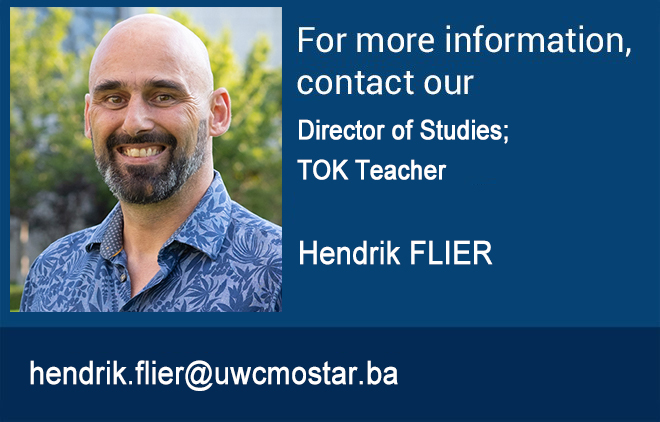Beyond the IB
Global Awareness
Global Awareness is a student-led discussion platform that happens every other Monday morning, during school time and includes all students and teachers. A group of students and a teacher organize the introduction and then facilitate an open discussion amongst the entire community on some issue of global or local significance. So while it's not difficult to start opinions in a discussion about freedom of speech or the legalization of drugs, sometimes the school body has to be informed about an different aspects of an issue first, as for the legitimacy of the UN Human Rights or the positive/negative effects of robotic innovation.
Past topics have included: the responsibility of the new media to show horrific images; legalization of prostitution; mandatory military/national service; various forms of terrorism; the legitimacy of military intervention; medical ethics and the pharmaceutical industry; “volun-tourism.”
Balkan Studies
Introduced in 2014, Balkan Studies asks first year students to explore the complex histories and recent pasts of the region we live in for two years. Students from the region act as hosts and translators, but are also forced to engage the assumptions they’ve grown up with; students from outside the region are challenged to move beyond the stereotypes they’ve arrived with, and to deepen their knowledge of history, politics, and culture of this place.
Term 1
Weeks 1-2: Space and Time – Using google earth and a set of online timelines, we introduce students to the general geography of the region and ask each house to create a 1000-year timeline of the history of the region
Weeks 3-6: “Local” crash course – The local language speaker serves as a language tutor for the other house-members; our local language teacher prepares the structure of the lessons, and students work in groups to learn some of the basics of the language. At the end, they produce short videos using dialogues they’ve learned.
Weeks 7-10: History of Identity – For these four weeks, we break large group into four smaller groups, and they rotate through four lessons that complicate students’ understanding of identity in the Balkans by recognizing the dynamic histories behind the four topics – religion, language, politics/the state, and how outsiders have viewed the region.
Weeks 11-14: Yugoslavia, War, and Peace – In the first week of this four week unit, we briefly explore what Yugoslavia was, but do so in part through the (fun) concept of “Yugo-nostalgia.” In the subsequent two weeks, we first ask students from the region to present to their peers what they know about the 1990s war – from their families, from their prior education, from their “common sense.” We then directly engage the 1990s war, but do so through the personal stories of our community members, emphasizing the multiplicity of experiences in this war, challenging the idea that there are “three” narratives. In the final week, we discuss “the peace” – the Dayton Accords, and its difficult effects.
Week 15: Balkan Festivals – To lighten the mood a bit, we end the first term with a tour through a range of the festivals in the region.
Term 2
In the second term, we do three multi-week community engagement projects, which are interspersed with lighter lessons on cultural aspects of the region.
Weeks 1-3: Mostar History and Place Project – We spend one week learning a bit about Mostar’s history, and ask second years and teachers to share their favorite secret place in town. For the following two weeks, families research the history of a particular place in Mostar.
Week 4: Music – Valentina takes the students through several decades of Yugoslav music, understanding why one music critic said that the three capitals of rock and roll were the US, the UK, and Yugoslavia.
Week 5: Dance – Bosnian students (including a few guest teachers from the Gimnazija) are the teachers for groups in a Balkan Dance Competition.
Weeks 6-8: Divided Cities Project – We spend the first week looking at other “divided cities,” unpacking the various ways in which a city can be “divided.” In the subsequent two weeks, students do research in the city to understand the ways in which Mostar is still a divided city – though not only along ethno-nationalist lines – and consider the ways in which it is not so divided.
Week 9: Balkan Youth Film Festival – Students curate a film festival in the residences and around town with films from the region that highlight the experience of young people.
Week 10: Student Research on the Balkans Conference – Once all the IAs and EEs are, second years who have done research projects on something in the Balkans are organized into panels by theme, and they present to first years what they’ve learned.
Weeks 11-15: Voices of Mostar – The capstone project for the course is to conduct an oral history of a person from the region. We spend the two weeks learning what oral history is, examining some models, and learning some of the technical skills necessary to complete the project, and the subsequent two weeks conducting the oral interviews and polishing the videos. See a few of last year’s on our youtube channel, “Voices of Mostar UWCiM.”
